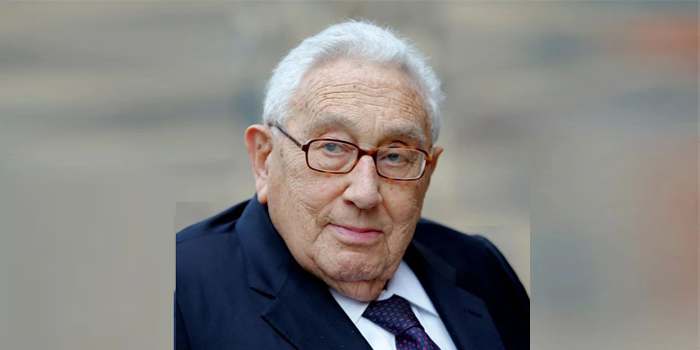J K News Today
Jammu, November 30: Henry Kissinger, a controversial Nobel Peace Prize winner who defined US foreign policy for decades died on Wednesday at age 100 , according to geopolitical consulting firm Kissinger Associates Inc.
Kissinger was responsible for changing the shape of the geopolitics of South Asia , especially when he was secretary of state with President Richard Nixon .His anti-India stand in 1970s, when the US helped Pakistan in 1971 war, and later paved way for the US-China friendship using the good offices of Pakistan , brought a major shift in the geopolitics of the region .
According to news agencies , Kissinger was considered diplomatic powerhouse whose services under two two presidents left an indelible mark on US foreign policy, died on Wednesday at age 100, according to his geopolitical consulting firm Kissinger Associates Inc.
Kissinger died at his home in Connecticut, the firm said in a statement. No mention was made of the circumstances. It said he would be interred at a private family service, to be followed at a later date by a public memorial service in New York City.
Kissinger had been active past his centenary, attending meetings in the White House, publishing a book on leadership styles, and testifying before a Senate committee about the nuclear threat posed by North Korea.
Kissinger had been active past his centenary, attending meetings in the White House, publishing a book on leadership styles, and testifying before a Senate committee about the nuclear threat posed by North Korea. In July 2023 he made a surprise visit to Beijing to meet Chinese President Xi Jinping.
In the 1970s, he had a hand in many of the epoch-changing global events of the decade while serving as secretary of state under Republican President Richard Nixon.
The German-born Jewish refugee’s efforts led to the diplomatic opening of China, landmark US-Soviet arms control talks, expanded ties between Israel and its Arab neighbors, and the Paris Peace Accords with North Vietnam.
In his time as a US secretary of state, he dramatically shifted US relations in the Cold War, in Vietnam, and in China.
Kissinger secretly flew to Beijing in July 1971 on a mission to establish relations with China, setting the stage for a landmark visit by President Richard Nixon who sought both to shake up the Cold War and enlist help ending the Vietnam war.
The United States opening to then isolated Beijing contributed to China’s rise to become a manufacturing powerhouse and the world’s largest economy after America.
Kissinger was controversially co-awarded the Nobel Peace Prize for negotiating a ceasefire in Vietnam in 1973. But for many, Kissinger was seen as an unindicted war criminal for his role in, among other events, expanding the Vietnam war to Cambodia and Laos.
Some historians estimate that hundreds of thousands of civilians died in the US aerial bombing campaign.
He was also reviled for supporting coups in Chile and Argentina, greenlighting Indonesia’s bloody invasion of East Timor in 1975 and turning a blind eye to Pakistan’s mass atrocities during Bangladesh’s 1971 war of independence.
After leaving office, Kissinger grew wealthy advising businesses on China and warned against the hawkish turn in US policy towards Beijing.




